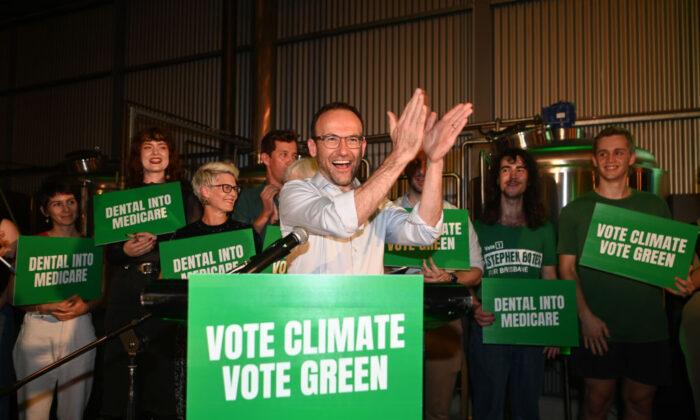The left-wing Australian Greens say they will soften their demands for a proposed fossil fuel ban to shake hands with the centre-left Labor government to pass its carbon credit reforms in an effort to tackle climate change.
The so-called “Safeguard Mechanism Reforms (Crediting) Amendment bill,” which the Labor government is looking to pass through the Senate, requires Australia’s largest greenhouse gas emitters to keep their net emissions below an emissions limit. Businesses can “offset” emissions deemed in excess of government regulations by purchasing carbon credits.
After the centre-right Coalition said they would oppose the bill, Labor has been at a crossroads with the Greens, who attempted to block the bill unless Labor promised to stop all new coal or gas projects, regardless of the impact on the economy and the energy needs of Australians.
But Greens leader Adam Bandt said his party would compromise their stance if Labor presented a “different way” of dealing with the question of coal and gas.
“It’s an offer, not an ultimatum and we’ve made that clear. We’ve said: Look, there’s some significant problems with the scheme … We’ll put those aside and give it a go. And here’s our offer. Just stop making things worse by opening new coal and gas now,” Bandt told Sky News on Sunday.
He suggested putting a “climate trigger” in the nation’s environment laws when assessing new coal and gas projects, and putting “a pause on approvals” while the government is looking at how to deal with the situation “in a holistic way.”
“We’re happy to have a look at suggestions that are put on the table about how to deal with this question of coal and gas,” he added.
“The ball is in Labor’s court now.”
“At the moment, what Labor is putting on the table is a policy that sees the situation get worse because they’re opening new coal and gas mines and at the moment—that’s the sticking point.”

In its election promise, the Greens said they want to replace coal and gas with 100 percent renewable energy by 2030 and impose an “immediate ban on any new coal, oil, and gas projects.”
Climate Change Minister Chris Bowen previously said, “I’m not here to tell the Greens how to vote.”
“We have a relationship with the Greens where we can talk issues through but within parameters, and the parameters of which I'll discuss these issues is the election mandate we sought and received.”
Shadow Energy Minister Ted O’Brien warned that Labor’s carbon tax mechanism in the name of saving our modern way of life from climate change would “whack businesses with new government imposed costs” at a time when families are “screaming out for help” as cost of living mounts.
“If businesses don’t collapse under the weight of Labor’s expensive energy policies, it’s likely they will pass costs on to customers including everyday Australian households,” he said in a media release on Jan. 11.
He previously told Sky News on Jan. 11 that under the legislation, businesses would need to reduce their emissions by 5 percent a year, which is the highest demand of any government in the world.
“The name of the game has to be decarbonizing, not decapitating the Australian economy. And that’s what this starts,” he said, referring to Labor’s carbon credit bill. “What we see the Albanese Labor government [doing is] they’re taking the country down the wrong path to decarbonize. We’ve seen that every single time you open up your power bill, you see that prices are going up.”
O’Brien also told Sydney’s 2GB radio that the policy was “the biggest carbon tax Labor has introduced” and is three times more expensive than the carbon tax under former Labor Prime Minister Julia Gillard.
The Gillard government priced carbon at A$23 (US $15.31) a tonne, compared to $75 a tonne now under the Albanese government.
O'Brien warned that under the Albanese government’s policy, by 2030, the cost will be up to $100 per tonne of carbon emissions.
AGL raised gas prices from Jan. 1 for customers on standing offers and from Feb. 1 for customers on variable rate market contracts, while Origin Energy’s gas price hikes took effect from Feb. 1.




